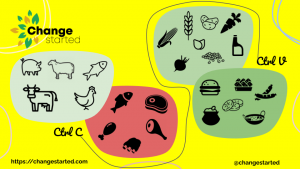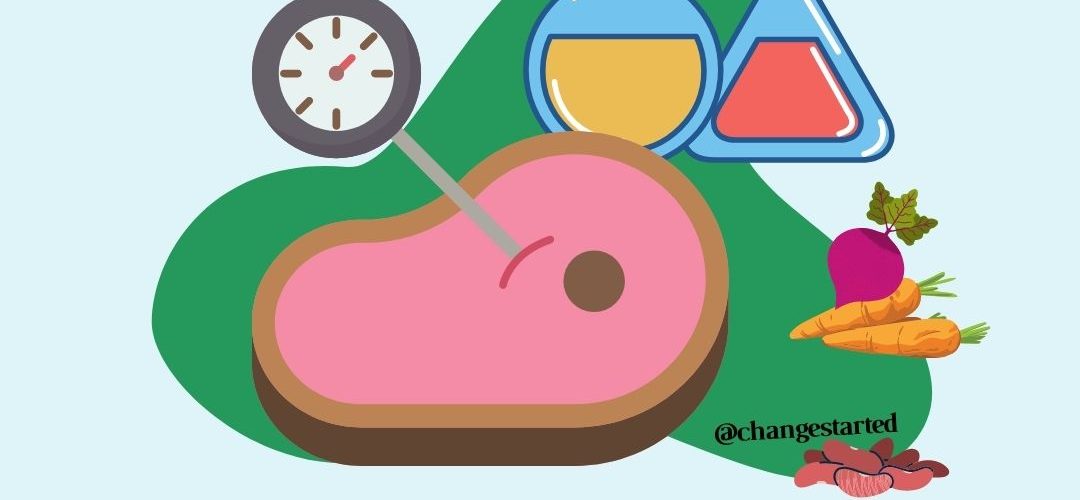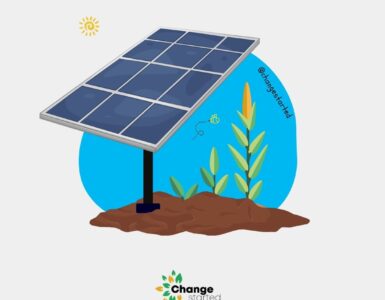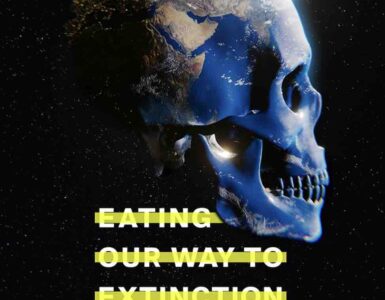What If I say, the C is Chicken or Cow and V is Vegetables –
Just kidding –

I am talking about Plant-Based meat or imitation meat
Plant-based meat is not a typical vegetable pattie but this food is made to look, taste, smell, feel, and appear like meat. A replica of the non-vegetarian food options is created – chicken, mutton, beef, pork, and fish – but made entirely with plants & vegetables.
Sounds Interesting?
How is this made? It is a science
We all know that meat products are rich in proteins, which provide them with an elastic & springy texture. To give the plant-based meat the same texture, the main component of the plant-based meat option is the use of protein extracts from the vegetables & grains. The common plants that are used for proteins are soybeans, peas, chickpeas, grams, and beans among others.
Depending on the kind of meat alternative being, other ingredients can vary – like Beetroot, wheat, potato, carrot, oats, and corn along with oil, spices, yeast, starch, etc.
Are there any companies doing this?
The market is flooded with companies offering a variety of plant-based meat substitutes. Some of them include – plant-based patties, burgers, sausage, crumble, mixed with rice (pulao & biryani), curry, etc. – they come in the ready-to-eat segment or can be cooked in your kitchen.
In the last 6-7 years, the market has grown exponentially, led by companies from the US, UK, Canada, China, and India.
Market strategies differ from company to company, some of them collaborated with fast-food chains to offer their products as part of the meals. Some went directly to consumers through grocery/online stores. The companies are not just targeting vegetarian eaters or vegans, but the main segment is the meat consumers.
Early Adopters of plant-based meat
Plant-based meat adoption is not entirely a new thing, there are instances in the past as well, where we have heard about using plant substitutes for meat.
- Biryani, which is a dish made of rice and meat, which is extremely popular in India & the Middle East has had a plant-based alternative for ages. The vegetarians in India found their own Biryani by adding jackfruit, mainly because its look and texture looked similar to mutton Biryani.
- In 1896, John Harvey Kellogg created a peanut-based “meatless meat,” Nuttose.
- In 1922, US-based Madison Foods developed the first soy-bean-based meat alternative product. From thereon, soybeans became a major ingredient in subsequent meat alternative products.
- In the 1980s, with the advancement in science, companies started experimenting with plant proteins to create food that started to look similar to meat options.
What are the challenges of Non-Vegetarian food?
I love my non-veg food, what’s the fuss about?
Many people have advocated a vegetarian diet for health reasons & animal welfare, but there is another big element that not many of us focus on – that is about Environment.
Most researchers have estimated that 15–18% of the global greenhouse gas (GHG) emissions are due to animal farming (meat, milk).
If you are wondering how… Let me give some plain & simple points, without exaggerations.
Like you & me, the animals also poo fart, and burp.
That waste releases nitrous oxide and methane, and as per scientists “methane is a far more potent greenhouse gas than CO2″.
Imagine billions of animals, doing their things , and polluting the air & drinking water.
Like you & me, the animals are fed with food & water
Livestock is fed corn, soybean meal, grass, and other grains.
Grain production, in particular, requires significant quantities of fertilizer, fuel, pesticides, water, and land.
Imagine all the land used to grow this food, the vehicles required to transport it, and the irrigation to bring the water they need to drink.
Like you & me, the animals need a place to stay
Cows, goats, pigs, chickens – all of them need a place to stay. More than 30% of the land is used by animal farms and poultry.
Imagine, the land required to keep all these animals and grow the food.
Trees after Trees are cut, Forests after forests are cleared – to make way for livestock fodder or a place for them to live. When we deforest, it is not just the trees & oxygen, the dependent wildlife also gets impacted.
In addition, there is extensive use of chemicals & supplements in animal fodder to make them grow bigger & faster.
The number of animals used for food is going into billions, while wildlife animals like Elephants, Tigers, leopards, Rhinoceros, orangutans, chimpanzees, Whales, and Dolphins are facing an existential crisis.
Final Words
Food is an essential ingredient in our lives, we eat not just to survive, but the pleasure it brings in our lives cannot be expressed in words. Though we eat food from the mouth, an extraordinary connection between food is established with the brain.
Over the last few centuries, non-vegetarian food has caught the fancy of people – beef, mutton, chicken, pork, and fish have become part of every meal. In 1812, the world’s human population was ~1 billion, in 1912 it was about 1.5 billion, in 2012 it was 7 billion.
When the human population was less, the ecosystem was able to sustain itself. The fast-growing population is putting extreme pressure on the land, food & water resources and is becoming extremely disastrous to the climate.
It is not that we have to stop consuming the foods we love. When alternatives are available, that are similar in taste, smell, and even look – why can’t we reduce animal consumption and bring these meat-look-a-like plant-based foods into our diets?
For non-vegetarians, the suggestion would be to go for incremental changes in the diet. Including lots of vegetables, fruits, plant-based meat alternatives, and occasional meat-based options (for special occasions) – this could be a technique that you can adopt.
There are many research reports which have said, that the same resources can produce many times more plant-based food than animal-based food.
Making them great for the environment.
George Bernard Shaw said “There is no sincere love than the love of food”






Add comment